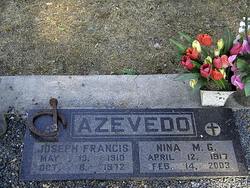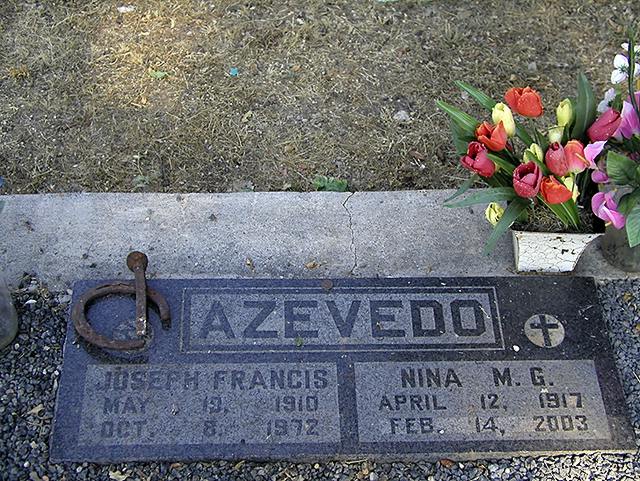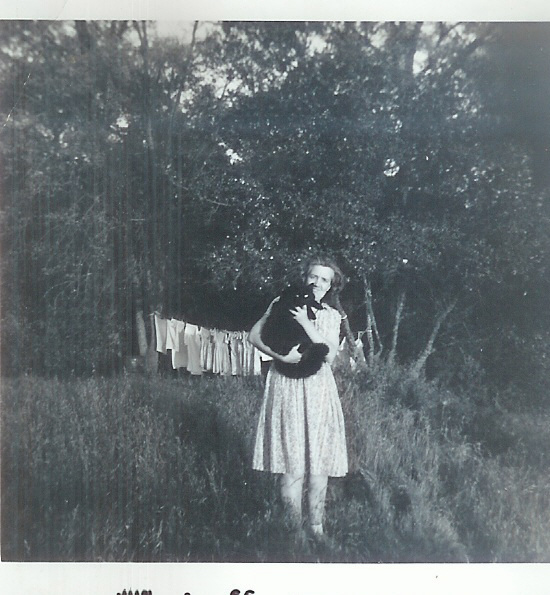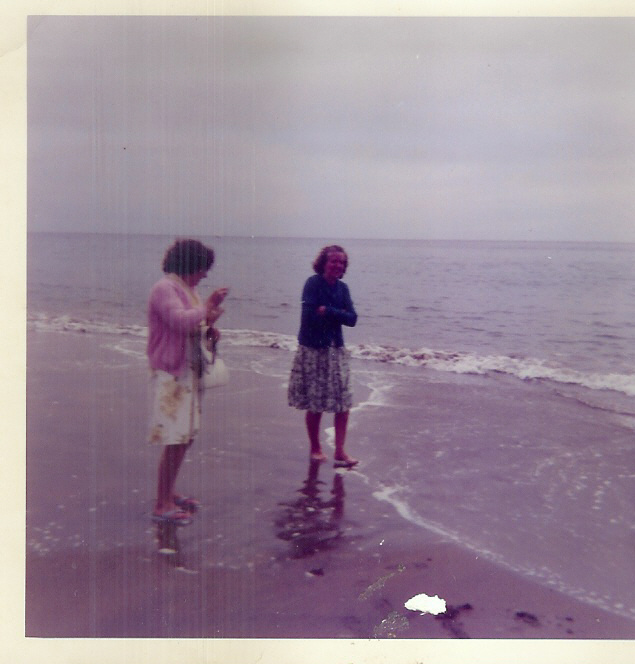Mrs. Azevedo was born in Pocatello, Idaho and moved to Sausalito, CA in 1924, graduating from Mt. Tamalpais high school in 1935.
She married Joseph Azevedo on September 3, 1938, and moved to Tuttletown, living there until her hospitalization.
She was a homemaker and talented seamstress, sewing on a treadle sewing machine. Her children won many prizes on Halloween wearing costumes she created. She was also active in the Humane Society.
Mrs. Azevedo is survived by two brothers and their spouses, Leonard and Leona Thoelecke of San Anselmo and Carl and Sylvia Thoelecke of Kentfield; a cousin, Amelia Hartman of Omaha, Nebraska; five children and their spouses; sixteen grandchildren and 39 great-grandchildren.
She was preceded in death by her husband; a sister, Bertha Anna Louise Thoelecke,and four grandchildren, Alan, Warren and Gerald "Rusty" Gardner and John Azevedo.
-----------------------------------
County Dog Sales Program Scored
Union Democrat
January 3, 1962
Page 16, Columns 1-2
Tuolumne County’s policy of selling dogs for medical research was attacked this week by Mrs. Joseph Azevedo of Tuttletown.
In an appearance before the board, Mrs. Azevedo said she is not against vivisection itself. She explained, “There is cruelty in laboratories. That’s what I’m fighting.”
Noting the Tuolumne County dogs are sold to the University of California in San Francisco, Mrs. Azevedo suggested there should be plenty of dogs in the bay city to supply the laboratory. If laws can be adopted to eliminate cruelty, she said, humane societies would be willing to supply animals for the medical research programs. Supervisor Abe Still questioned, “Where should our first loyalty be – to the welfare of the human race or to animals?”
But Mrs. Azevedo again stressed that she is interested in preventing cruelty to animals.
She reported a local resident plans to open a private animal shelter if the county fails to reconsider its present dog disposal program. She said the project would be privately financed through contributions from people interested in animals and through fundraising projects.
Supervisor Warne Keagy asked if Mrs. Azevedo has ever visited a medical laboratory where animals are used in experimentation. She replied, “No, but I’ve read about it. I’ve studied this several years and read about it.”
Supervisor Keagy also asked if Mrs. Azevedo was a member of the local humane society. She advised, “No, I don’t belong to any organization. I don’t have time, but I have talked with several members.”
Supervisor Still reaffirmed his views on vivisection by concluding, “Without animals, medical research is crippled.”
On Page One, Column Four of the same newspaper appeared an account of the activity at the pound during December 1961. The story read as follows:
33 Dogs, Cats Go To Research
Tuolumne County sent 33 abandoned animals – 16 dogs and 17 cats – to the University of California Medical center during the month of December.
In a report to the board of supervisors, Poundmaster F. Vernon Reitz reported a total of 35 dogs and 30 cats were received at the pound during the month. Nine dogs were discharged, and two dogs and 14 cats were destroyed.
Reitz reported he traveled a total of 1,092 miles in performance of his duties, collected $11 in fees, answered two dog complaints and quarantined two dogs and one cat.
In the same newspaper appeared a letter by Nina Azevedo.
Union Democrat
January 3, 1962
Page 5, Columns 3-4
Letters to the Editor
To the Editor:
The general public is indifferent; the press has closed its eyes and the California State and government officials seem not concerned about it. But some of us are reminded, even during the holidays, about pound seizure ordinances and what goes on in research laboratories.
It is time to wake up and save our animals from pound seizure, to support a humane society we can be proud of, to listen to humane officers who are concerned about the welfare of animals and who have the facts about cruelty to animals in laboratories.
Although I have not found the time to join a humane society, I have read for more than a year the literature published by humane groups. I was told some months ago by a state humane officer that animals’ vocal cords are cut and I just now read about a stolen dog that was “de-barked” in a California research laboratory. This is, quoting from humane society literature, “a standard procedure on dogs used for research, which consists in surgically severing the vocal cords, to prevent the animal from making a noise.” This is only one of many cruelties in laboratories. Some animals suffer because proper anesthesia is not used.
The tragic thing is that we do not have good laws to protect laboratory animals. You can help by urging your congressmen to pass in Washington a laboratory bill to protect animals from cruelty and also to try to persuade a stubborn bunch of county supervisors not to sell our pound animals in 1962.
Mrs. Joe Azevedo
Tuttletown
Mrs. Azevedo was born in Pocatello, Idaho and moved to Sausalito, CA in 1924, graduating from Mt. Tamalpais high school in 1935.
She married Joseph Azevedo on September 3, 1938, and moved to Tuttletown, living there until her hospitalization.
She was a homemaker and talented seamstress, sewing on a treadle sewing machine. Her children won many prizes on Halloween wearing costumes she created. She was also active in the Humane Society.
Mrs. Azevedo is survived by two brothers and their spouses, Leonard and Leona Thoelecke of San Anselmo and Carl and Sylvia Thoelecke of Kentfield; a cousin, Amelia Hartman of Omaha, Nebraska; five children and their spouses; sixteen grandchildren and 39 great-grandchildren.
She was preceded in death by her husband; a sister, Bertha Anna Louise Thoelecke,and four grandchildren, Alan, Warren and Gerald "Rusty" Gardner and John Azevedo.
-----------------------------------
County Dog Sales Program Scored
Union Democrat
January 3, 1962
Page 16, Columns 1-2
Tuolumne County’s policy of selling dogs for medical research was attacked this week by Mrs. Joseph Azevedo of Tuttletown.
In an appearance before the board, Mrs. Azevedo said she is not against vivisection itself. She explained, “There is cruelty in laboratories. That’s what I’m fighting.”
Noting the Tuolumne County dogs are sold to the University of California in San Francisco, Mrs. Azevedo suggested there should be plenty of dogs in the bay city to supply the laboratory. If laws can be adopted to eliminate cruelty, she said, humane societies would be willing to supply animals for the medical research programs. Supervisor Abe Still questioned, “Where should our first loyalty be – to the welfare of the human race or to animals?”
But Mrs. Azevedo again stressed that she is interested in preventing cruelty to animals.
She reported a local resident plans to open a private animal shelter if the county fails to reconsider its present dog disposal program. She said the project would be privately financed through contributions from people interested in animals and through fundraising projects.
Supervisor Warne Keagy asked if Mrs. Azevedo has ever visited a medical laboratory where animals are used in experimentation. She replied, “No, but I’ve read about it. I’ve studied this several years and read about it.”
Supervisor Keagy also asked if Mrs. Azevedo was a member of the local humane society. She advised, “No, I don’t belong to any organization. I don’t have time, but I have talked with several members.”
Supervisor Still reaffirmed his views on vivisection by concluding, “Without animals, medical research is crippled.”
On Page One, Column Four of the same newspaper appeared an account of the activity at the pound during December 1961. The story read as follows:
33 Dogs, Cats Go To Research
Tuolumne County sent 33 abandoned animals – 16 dogs and 17 cats – to the University of California Medical center during the month of December.
In a report to the board of supervisors, Poundmaster F. Vernon Reitz reported a total of 35 dogs and 30 cats were received at the pound during the month. Nine dogs were discharged, and two dogs and 14 cats were destroyed.
Reitz reported he traveled a total of 1,092 miles in performance of his duties, collected $11 in fees, answered two dog complaints and quarantined two dogs and one cat.
In the same newspaper appeared a letter by Nina Azevedo.
Union Democrat
January 3, 1962
Page 5, Columns 3-4
Letters to the Editor
To the Editor:
The general public is indifferent; the press has closed its eyes and the California State and government officials seem not concerned about it. But some of us are reminded, even during the holidays, about pound seizure ordinances and what goes on in research laboratories.
It is time to wake up and save our animals from pound seizure, to support a humane society we can be proud of, to listen to humane officers who are concerned about the welfare of animals and who have the facts about cruelty to animals in laboratories.
Although I have not found the time to join a humane society, I have read for more than a year the literature published by humane groups. I was told some months ago by a state humane officer that animals’ vocal cords are cut and I just now read about a stolen dog that was “de-barked” in a California research laboratory. This is, quoting from humane society literature, “a standard procedure on dogs used for research, which consists in surgically severing the vocal cords, to prevent the animal from making a noise.” This is only one of many cruelties in laboratories. Some animals suffer because proper anesthesia is not used.
The tragic thing is that we do not have good laws to protect laboratory animals. You can help by urging your congressmen to pass in Washington a laboratory bill to protect animals from cruelty and also to try to persuade a stubborn bunch of county supervisors not to sell our pound animals in 1962.
Mrs. Joe Azevedo
Tuttletown
Family Members
Sponsored by Ancestry
Advertisement
Advertisement













